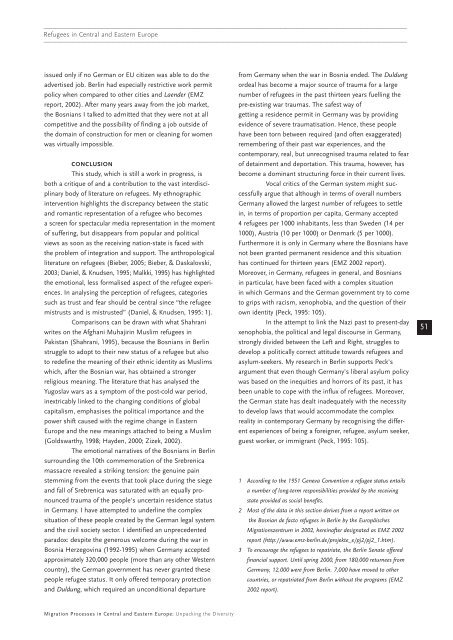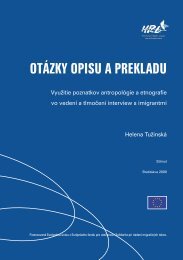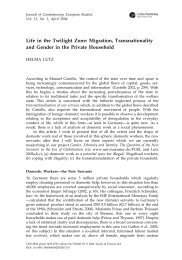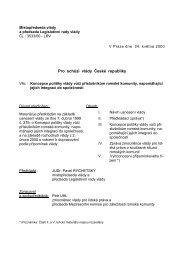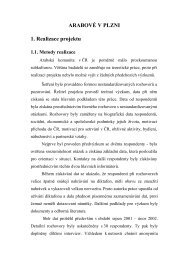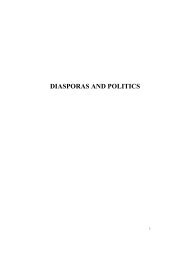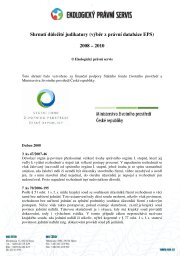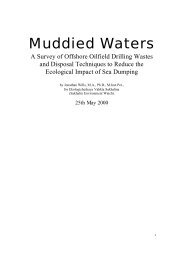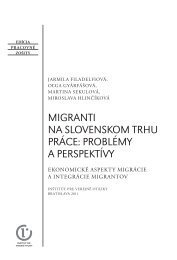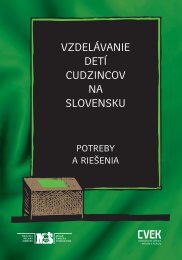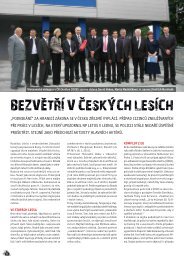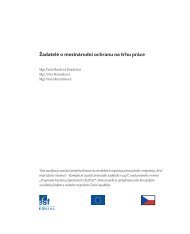Migration Processes in Central and Eastern Europe - Multiple Choices
Migration Processes in Central and Eastern Europe - Multiple Choices
Migration Processes in Central and Eastern Europe - Multiple Choices
Create successful ePaper yourself
Turn your PDF publications into a flip-book with our unique Google optimized e-Paper software.
———————————————————————————————————————————————————————————————<br />
Refugees <strong>in</strong> <strong>Central</strong> <strong>and</strong> <strong>Eastern</strong> <strong>Europe</strong><br />
———————————————————————————————————————————————————————————————<br />
issued only if no German or EU citizen was able to do the<br />
advertised job. Berl<strong>in</strong> had especially restrictive work permit<br />
policy when compared to other cities <strong>and</strong> Laender (EMZ<br />
report, 2002). After many years away from the job market,<br />
the Bosnians I talked to admitted that they were not at all<br />
competitive <strong>and</strong> the possibility of f<strong>in</strong>d<strong>in</strong>g a job outside of<br />
the doma<strong>in</strong> of construction for men or clean<strong>in</strong>g for women<br />
was virtually impossible.<br />
CONCLUSION<br />
This study, which is still a work <strong>in</strong> progress, is<br />
both a critique of <strong>and</strong> a contribution to the vast <strong>in</strong>terdiscipl<strong>in</strong>ary<br />
body of literature on refugees. My ethnographic<br />
<strong>in</strong>tervention highlights the discrepancy between the static<br />
<strong>and</strong> romantic representation of a refugee who becomes<br />
a screen for spectacular media representation <strong>in</strong> the moment<br />
of suffer<strong>in</strong>g, but disappears from popular <strong>and</strong> political<br />
views as soon as the receiv<strong>in</strong>g nation-state is faced with<br />
the problem of <strong>in</strong>tegration <strong>and</strong> support. The anthropological<br />
literature on refugees (Bieber, 2005; Bieber, & Daskalovski,<br />
2003; Daniel, & Knudsen, 1995; Malkki, 1995) has highlighted<br />
the emotional, less formalised aspect of the refugee experiences.<br />
In analys<strong>in</strong>g the perception of refugees, categories<br />
such as trust <strong>and</strong> fear should be central s<strong>in</strong>ce “the refugee<br />
mistrusts <strong>and</strong> is mistrusted” (Daniel, & Knudsen, 1995: 1).<br />
Comparisons can be drawn with what Shahrani<br />
writes on the Afghani Muhajir<strong>in</strong> Muslim refugees <strong>in</strong><br />
Pakistan (Shahrani, 1995), because the Bosnians <strong>in</strong> Berl<strong>in</strong><br />
struggle to adopt to their new status of a refugee but also<br />
to redef<strong>in</strong>e the mean<strong>in</strong>g of their ethnic identity as Muslims<br />
which, after the Bosnian war, has obta<strong>in</strong>ed a stronger<br />
religious mean<strong>in</strong>g. The literature that has analysed the<br />
Yugoslav wars as a symptom of the post-cold war period,<br />
<strong>in</strong>extricably l<strong>in</strong>ked to the chang<strong>in</strong>g conditions of global<br />
capitalism, emphasises the political importance <strong>and</strong> the<br />
power shift caused with the regime change <strong>in</strong> <strong>Eastern</strong><br />
<strong>Europe</strong> <strong>and</strong> the new mean<strong>in</strong>gs attached to be<strong>in</strong>g a Muslim<br />
(Goldswarthy, 1998; Hayden, 2000; Zizek, 2002).<br />
The emotional narratives of the Bosnians <strong>in</strong> Berl<strong>in</strong><br />
surround<strong>in</strong>g the 10th commemoration of the Srebrenica<br />
massacre revealed a strik<strong>in</strong>g tension: the genu<strong>in</strong>e pa<strong>in</strong><br />
stemm<strong>in</strong>g from the events that took place dur<strong>in</strong>g the siege<br />
<strong>and</strong> fall of Srebrenica was saturated with an equally pronounced<br />
trauma of the people's uncerta<strong>in</strong> residence status<br />
<strong>in</strong> Germany. I have attempted to underl<strong>in</strong>e the complex<br />
situation of these people created by the German legal system<br />
<strong>and</strong> the civil society sector. I identified an unprecedented<br />
paradox: despite the generous welcome dur<strong>in</strong>g the war <strong>in</strong><br />
Bosnia Herzegov<strong>in</strong>a (1992-1995) when Germany accepted<br />
approximately 320,000 people (more than any other Western<br />
country), the German government has never granted these<br />
people refugee status. It only offered temporary protection<br />
<strong>and</strong> Duldung, which required an unconditional departure<br />
from Germany when the war <strong>in</strong> Bosnia ended. The Duldung<br />
ordeal has become a major source of trauma for a large<br />
number of refugees <strong>in</strong> the past thirteen years fuell<strong>in</strong>g the<br />
pre-exist<strong>in</strong>g war traumas. The safest way of<br />
gett<strong>in</strong>g a residence permit <strong>in</strong> Germany was by provid<strong>in</strong>g<br />
evidence of severe traumatisation. Hence, these people<br />
have been torn between required (<strong>and</strong> often exaggerated)<br />
remember<strong>in</strong>g of their past war experiences, <strong>and</strong> the<br />
contemporary, real, but unrecognised trauma related to fear<br />
of deta<strong>in</strong>ment <strong>and</strong> deportation. This trauma, however, has<br />
become a dom<strong>in</strong>ant structur<strong>in</strong>g force <strong>in</strong> their current lives.<br />
Vocal critics of the German system might successfully<br />
argue that although <strong>in</strong> terms of overall numbers<br />
Germany allowed the largest number of refugees to settle<br />
<strong>in</strong>, <strong>in</strong> terms of proportion per capita, Germany accepted<br />
4 refugees per 1000 <strong>in</strong>habitants, less than Sweden (14 per<br />
1000), Austria (10 per 1000) or Denmark (5 per 1000).<br />
Furthermore it is only <strong>in</strong> Germany where the Bosnians have<br />
not been granted permanent residence <strong>and</strong> this situation<br />
has cont<strong>in</strong>ued for thirteen years (EMZ 2002 report).<br />
Moreover, <strong>in</strong> Germany, refugees <strong>in</strong> general, <strong>and</strong> Bosnians<br />
<strong>in</strong> particular, have been faced with a complex situation<br />
<strong>in</strong> which Germans <strong>and</strong> the German government try to come<br />
to grips with racism, xenophobia, <strong>and</strong> the question of their<br />
own identity (Peck, 1995: 105).<br />
In the attempt to l<strong>in</strong>k the Nazi past to present-day<br />
xenophobia, the political <strong>and</strong> legal discourse <strong>in</strong> Germany,<br />
strongly divided between the Left <strong>and</strong> Right, struggles to<br />
develop a politically correct attitude towards refugees <strong>and</strong><br />
asylum-seekers. My research <strong>in</strong> Berl<strong>in</strong> supports Peck's<br />
argument that even though Germany's liberal asylum policy<br />
was based on the <strong>in</strong>equities <strong>and</strong> horrors of its past, it has<br />
been unable to cope with the <strong>in</strong>flux of refugees. Moreover,<br />
the German state has dealt <strong>in</strong>adequately with the necessity<br />
to develop laws that would accommodate the complex<br />
reality <strong>in</strong> contemporary Germany by recognis<strong>in</strong>g the different<br />
experiences of be<strong>in</strong>g a foreigner, refugee, asylum seeker,<br />
guest worker, or immigrant (Peck, 1995: 105).<br />
1 Accord<strong>in</strong>g to the 1951 Geneva Convention a refugee status entails<br />
a number of long-term responsibilities provided by the receiv<strong>in</strong>g<br />
state provided as social benefits.<br />
2 Most of the data <strong>in</strong> this section derives from a report written on<br />
the Bosnian de facto refugees <strong>in</strong> Berl<strong>in</strong> by the Europäisches<br />
<strong>Migration</strong>szentrum <strong>in</strong> 2002, here<strong>in</strong>after designated as EMZ 2002<br />
report (http://www.emz-berl<strong>in</strong>.de/projekte_e/pj2/pj2_1.htm).<br />
3 To encourage the refugees to repatriate, the Berl<strong>in</strong> Senate offered<br />
f<strong>in</strong>ancial support. Until spr<strong>in</strong>g 2000, from 180,000 returnees from<br />
Germany, 12,000 were from Berl<strong>in</strong>. 7,000 have moved to other<br />
countries, or repatriated from Berl<strong>in</strong> without the programs (EMZ<br />
2002 report).<br />
51<br />
<strong>Migration</strong> <strong>Processes</strong> <strong>in</strong> <strong>Central</strong> <strong>and</strong> <strong>Eastern</strong> <strong>Europe</strong>: Unpack<strong>in</strong>g the Diversity


